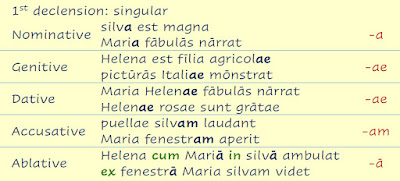Carolus et Maria
VII
In
silvā est casa parva et pulchra. Ibi habitat Helena, amīca
Mariae. Helena est fīlia pulchra agricolae bonī. Frātrēs et sorōrēs habet.
Agricola est pater benignus. Clārus nōn est quod fāma est parva,
sed Helenae est benignus. Hic vir magnam pecūniam nōn habet. Helena
saepe cum Mariā in silvā ambulat. Silva est alta et
magna. Puellae silvam laudant quod puellīs silva est grāta.
Maria Helenam amat. Maria Helenae fābulās de Italiā nārrat et amīcae pictūrās
Italiae mōnstrat. Ex fenestrā Maria silvam videt, et saepe casam Helenae
spectāre cupit, sed silva est magna.
Nunc
Maria fenestram aperit. Laeta est quod ibi rosās videt. Helena
rosās habēre cupit. Maria in viā ambulat et rosās portat. Maria Helenae rosās
ostendere cupit et Helena est laeta. Hae puellae sunt amīcae cārae.
Helenae rosae sunt grātae quod rosās in casā nōn habet. Iānua
Helenae est aperta. Nunc ibi est Helena.
Maria: Salvē,
Helena.
Helena: Salvē,
Maria.
Maria: Hoc est
dōnum. Tibi rosās dō.
Helena: Tibi
grātiās agō. Semper rosās cupiō. Tū es mihi benigna.
Maria: Tē
amō, quod tū es amīca mea cāra.
Helena: Habēsne
multās rosās? Cūrāsne tū rosās?
Maria: Ita, multās
habeō. Ego rosās cūrō. Interdum rosās Carolus cūrat. Rosae sunt
mihi grātae et hās cūrāre cupiō.
Helena: Cūr
Carolus rosās cūrāre nōn cupit?
Maria: Carolus est
puer et rosae nōn semper puerīs grātae sunt. Frāter meus fābulās legere
cupit et in silvā cum virīs labōrat. Interdum cum amīcō, Cassiō,
ambulat. Cassius Carolō est cārus quod hī sunt amīcī. Tū es mihi cāra
quod tū es amīca mea. Valē, Helena.
Helena: Valē,
Maria.
Helena iānuam claudit.
Vocabulary
[1]
fenestra: window
iānua: door
rosa: rose
silva: forest;
wood
[2]
tū es amīca mea │
you are my friend
tē amō │ I like / love you
tibi rosās dō │ I am giving
roses to you
[3]
benignus, -a, -um:
kind
- Helena > Helenae est benignus │ he is kind to Helena
- ego > Tū es mihi
benigna │ You are kind to me
cārus, -a, -um:
dear
- Carolus > Cassius Carolō est cārus │ Cassius is dear to Carolus
- ego > Tū es mihi cāra │
You are dear to me
clārus, -a, -um:
famous
grātus, -a, -um:
pleasing
- Helena > Helenae rosae sunt grātae │ The roses are pleasing to Helena = Helena likes the roses
- Puerī > rosae nōn puerīs grātae sunt │ The roses are not pleasing to the boys = the boys don’t like the roses
- puellae > puellīs silva est grāta │ The forest is pleasing to the girls = the girls like the forest
- ego > Rosae sunt mihi grātae │ The roses are pleasing to me = I like the roses
[4]
cum (+ ablative
case): (together) with
- Maria > cum Mariā … ambulat │ he is walking with Maria
- amīcus > cum amīcō … ambulat │ he is walking with a friend
- virī > cum virīs labōrat │ he is working with the men
ibi: there
[5]
[i]
ambulō: I walk
/ am walking
Maria in viā ambulat
│ Maria is walking in the street
[ii]
Ego rosās cūrō
│ I take care of the roses
Cūrāsne
tū rosās? │ Do you take care of the roses?
Rosās Carolus cūrat
│ Carolus takes care of the roses
Hās cūrāre cupiō.
│ I want to take care of them
[iii]
claudō: I
close
Helena iānuam
claudit │ Helena closes the door
[iv]
aperiō: I
open
Maria fenestram
aperit │ Maria opens the window
Notes
One of the
important aspects of this entire book is its conscious repetition of the case
endings and the way in which it manipulates the language to show certain very
common features.
[1] Do not try to
learn all the case endings at once.
[2] Begin to
identify the main uses of these case.
The image shows
[1] the case endings for the 1st declension of nouns and [2] the
main uses of the cases for all nouns. You can see that this is can be
summarised even with one example sentence although two are listed for each one.
The two examples for the ablative case show three of the most common
prepositions used.
Nominative
silva est
magna │ the forest is
large
Maria
fābulās nārrat│ Maria
tells stories
Genitive
Helena est fīlia
agricolae │ Helena is a
farmer’s daughter / the daughter of a farmer
pictūrās Italiae
mōnstrat │ she shows pictures of
Italy
Dative
Maria Helenae
fābulās nārrat │ Maria tells
stories to Helena
Helenae
rosae sunt grātae│ the roses
are pleasing to Helena
Accusative
puellae silvam
laudant│ the girls praise the
forest
Maria fenestram
aperit│ Maria opens the
window
Ablative
Helena cum
Mariā in silvā ambulat │ Helena is walking with Maria in
the forest
ex fenestrā Maria silvam videt│ out of the window Maria sees the forest


No comments:
Post a Comment